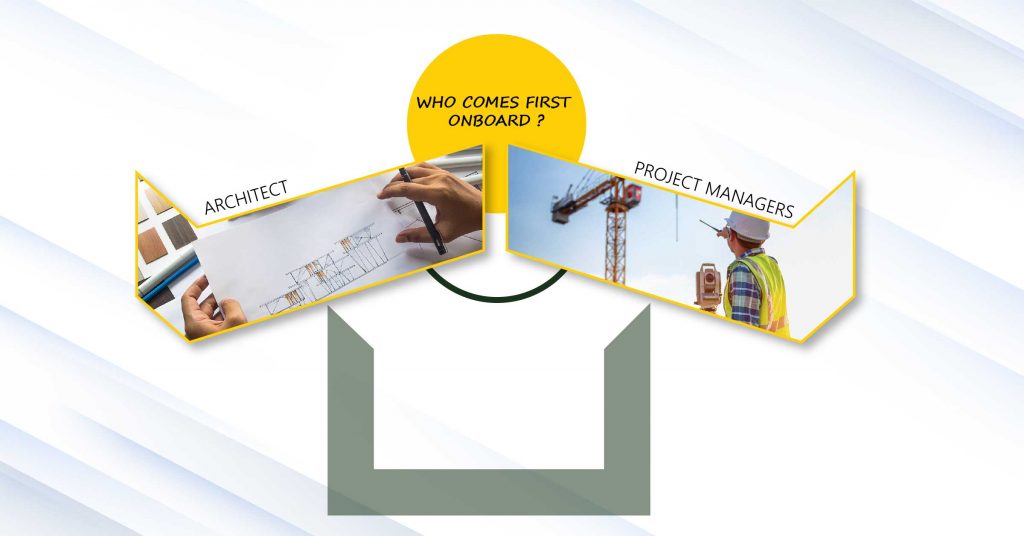GEM Engserv Pvt. Ltd is an ISO 9001:2015 certified organization, certified by TUV India in accreditation with National Accreditation Board for Certification Bodies (NABCB).
GEM Engserv Pvt. Ltd is an ISO 9001:2015 certified organization, certified by TUV India in accreditation with National Accreditation Board for Certification Bodies (NABCB).

This article is an attempt to put across viewpoints to regarding the quandary of whether to appoint the Architect or Project Management (PM) consultancy first. This dilemma is presumably faced by many, especially those who are part of developers’ teams or financial lenders. Please read Architect as ‘designer of project’ wherever referred to in this article and not the Architect/architectural firms who also provide project management services. Design and Project Management (PM) have been considered as separate functions assigned to different firms.
Since India’s independence and especially after opening of our market to global players in the 90’s, construction industry has seen manifold changes in terms of designs, materials, construction techniques, tools, processes, automation etc. A construction project in real estate sector progresses through various phases of project Lifecyle. Typically, a project undergoes 5 major phases listed below, and project teams perform different activities during each phase.
Each phase of project lifecycle has numerous interdependent activities, and these activities follow a particular logic and sequence during the implementation of the project. Accordingly, developers assign resources internally or from external service providers for performing these activities.
Traditionally, project proponents commonly known as ‘Developers’, build structures catering to the basic needs of common man without much of luxurious amenities of modern times. These developers used to have inhouse capabilities to perform all the functions of development i.e., from designing of a project till handing over of flats or office. However, with rapid economic growth over the years, not only demands & aspirations of India’s common man have increased but expats & multinationals investing in India, have also in certain ways raised the benchmark of the standards of real estate product, be it residential flat or commercial unit. Therefore, it was imperative for Indian developers to adapt to new ways of construction and implement systems as per globally accepted standards.
Developers had the options, either to update or acquire new skills of Project Management (PM) within their organizations or outsource whole or part of assignment, to external professional agencies with highly skilled workforce. All these changes have not occurred overnight, and it has been a continuous process of learning for all till date. Most of the organized players of the trade have taken the hardest route and learnt the PM skills internally within the organization for developing multiple and complex projects. Many have outsourced all or few of PM functions to professionals and managed only finances and legal side of the development. This trend is continuing today as well but percentage of outsourcing has increased where in developers are appointing external experts/organization to manage entire construction development and keeping limited team internally for coordination purpose.
However, this concept of outsourcing PM functions to external agencies did not end hardship of developers in totality. There are many reasons of project success and failure but assigning correct resources at appropriate time is one of the biggest contributors to project’s success. It said that ‘well begun is half done’. These resources are 5Ms men, materials, machinery, money & methods. Research has shown that if we carefully select and invest in good human resources (Men/technical people) at right time of any project, 80% of the problems get addressed automatically.
Developers who appoint external agencies to manage Design & PM functions, get baffled by the quest of correct time of bringing in any PM agency for the project. Should developer appoint PM agency before bringing in Designer on board? There is absolutely no harm in prioritizing appointment of designer onboard first, however some of the grey areas overlapping between design & execution activities will get addressed at advance stages of project only if appointment of PM happens at early phases.
Let us look at some of the key advantages of appointing PM agency at early stages of project:
Appointing PM agency prior to other designers and consultants may not be a standard solution to all problems arising in a project. However, developers or project proponents must weigh advantages and prioritise selection of PM agency with regards to many factors such as type, size & complexity of project, inhouse capabilities, project cost, statutory requirements, availability of competent & experienced PM agencies in the market.
GEM Engserv Private Ltd. , A-103, The Great Eastern Chamber, Plot No-28, Sector-11, CBD Belapur, Navi Mumbai 400614